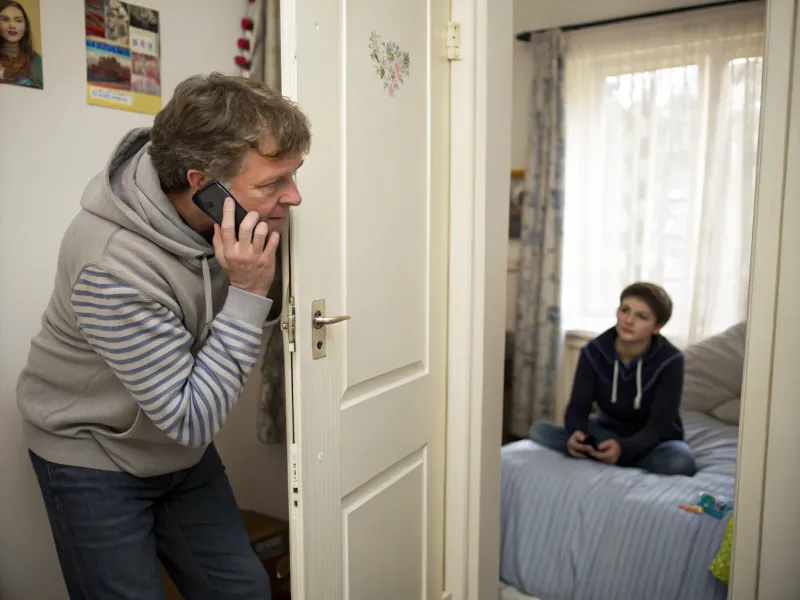32 Disturbingly Common Signs of a Toxic Parent
Navigating the treacherous waters of parent-child relationships can often feel like walking through a minefield, especially when you’re dealing with a toxic parent. These relationships, while inherently complex, are further complicated when toxicity is added to the mix. Recognizing the signs of a toxic parent can be the first step towards understanding and healing.
In this post, we will explore 32 distinct signs that can help identify such behaviors and understand their impact. With each sign detailed in an engaging manner, we aim to shine a light on the subtleties and overt actions that define toxic parenting, empowering you with the knowledge to spot and potentially break free from these harmful cycles.
1. Constant Criticism

Being on the receiving end of relentless criticism can feel like you’re under a never-ending spotlight. A toxic parent often critiques every move, decision, and thought their child has, leaving no room for encouragement or praise. This kind of behavior can severely damage a child’s self-esteem and confidence, planting seeds of doubt that linger into adulthood.
Imagine a world where nothing you do is ever good enough. Every achievement is overshadowed by what could have been done better. This constant barrage of negativity isn’t just exhausting; it’s destructive. Over time, children begin to internalize these critical voices, leading to a pervasive sense of inadequacy and self-doubt.
It’s not just about a lack of compliments; it’s an active campaign to undermine confidence. For those dealing with this, it’s vital to seek validation from supportive communities and practice self-compassion. Remember, growth doesn’t stem from perfection but from learning and evolving.
2. Emotional Manipulation

Emotional manipulation is the puppet master of toxic parenting. With a sly hand, toxic parents pull strings, twisting emotions to serve their own needs. This subtle manipulation often leaves children questioning their own feelings and reality, a bewildering and exhausting experience.
Picture a parent who feigns illness or sadness to control or guilt their child into doing something. It’s emotional blackmail, wrapped in a package of ‘good intentions.’ This behavior not only distorts the child’s ability to trust others but also themselves. It’s a constant game of emotional chess, where the parent holds all the pieces.
Breaking free involves recognizing the manipulation and setting firm emotional boundaries. Validating one’s own feelings and seeking support can dismantle these strings, allowing for the growth of healthier relationships and self-trust.
3. Lack of Boundaries

Boundaries—those invisible lines that separate us from others—are often bulldozed by toxic parents. They might snoop through personal belongings, ignore privacy, or make decisions without any input from the child, treating them as an extension of themselves rather than an individual.
Imagine never having a moment’s peace or privacy, as every aspect of your life is scrutinized and controlled. This lack of respect for boundaries fosters an environment where children feel suffocated and powerless. They grow up with blurred lines of personal space, struggling to understand where they end and others begin.
Encouraging autonomy and respecting personal space can help rectify this imbalance. It’s crucial for individuals to reclaim their boundaries, learning to say ‘no’ and reinforcing their space. This not only nurtures self-respect but also healthier future relationships.
4. Conditional Love

The concept of love, laden with conditions and expectations, can be a heavy burden to bear. Toxic parents often withhold affection or approval until certain demands are met, turning love into a transaction rather than an unconditional gift.
Visualize a world where love is rationed like a scarce resource, only given when specific terms are fulfilled. This conditional love fosters anxiety and insecurity, as children constantly strive to earn what should be freely given. It’s a perpetual chase for approval, akin to a dog chasing its tail.
To break free, it’s important to understand that love isn’t something to earn. Building a network of unconditional support, whether through friends or therapy, can help cultivate a healthier perspective on relationships and self-worth.
5. Gaslighting

Gaslighting—a term that evokes images of psychological trickery—is a cruel tool in the toxic parent’s arsenal. By denying reality or twisting facts, they make their child question their own memory, perception, and sanity. It’s a disorienting tactic designed to undermine confidence and control narratives.
Think about living in a world where your own experiences are constantly invalidated, making you doubt your every thought and feeling. This manipulation can cause a spiral of self-doubt and confusion, where nothing feels certain or true.
Overcoming gaslighting requires reaffirming one’s reality and seeking support from those who validate your experiences. Documenting interactions and trusting your instincts can also help reclaim control and clarity in personal narratives.
6. Playing the Victim

When toxic parents play the victim, they’re not just acting out a role; they’re reshaping reality to suit their needs. By casting themselves as the wronged party, they deflect responsibility and manipulate sympathy, turning genuine issues into a melodrama of their own making.
Imagine dealing with a parent who constantly shifts blame, turning every conflict into an opportunity to garner sympathy and attention. This tactic not only distorts reality but also places undue emotional burdens on the child, who might feel guilty for things beyond their control.
Understanding this dynamic is key to breaking free. Recognizing the pattern allows individuals to set boundaries and disengage from the guilt trips and emotional manipulation, fostering a more balanced and honest relationship.
7. Over-Control

Over-control is the remote control of toxic parenting—dictating every aspect of a child’s life from friendships to hobbies, and even thoughts. This excessive control stifles individuality, leaving children feeling like mere extensions of their parents.
Envision a life where every decision is made for you, from what you wear to who you associate with. This lack of autonomy can lead to a suppressed sense of self, where children struggle to understand their own identity and desires. It’s akin to being a puppet with strings pulled at the whim of someone else.
Reclaiming autonomy involves challenging these controls and making personal choices, no matter how small. Encouraging self-expression and individual pursuits helps rebuild a sense of identity and personal freedom.
8. Public Embarrassment

Public embarrassment is the toxic parent’s way of wielding shame as a weapon. Whether it’s berating in public or sharing private moments without consent, this behavior is designed to humiliate and control.
Imagine the mortification of being called out or criticized in front of others, an experience that’s both isolating and damaging. This tactic is intended to keep children in line through fear of public shaming, eroding self-confidence and trust.
Overcoming this involves recognizing the tactic for what it is—a means of control—and developing a resilient sense of self-worth. Finding supportive allies and fostering environments where children feel safe and valued can counteract the effects of public embarrassment.
9. Favoritism

Favoritism—the toxic parent’s selective spotlight—casts a long shadow over sibling relationships. By showering one child with affection and neglecting another, they sow seeds of resentment and rivalry that can last a lifetime.
Imagine living in a world where love and attention are unevenly distributed, leaving one child basking in the glow while another stands in the dark. This creates a dynamic that’s not just unfair but damaging to all involved, fostering jealousy and insecurity.
Addressing favoritism involves acknowledging it and fostering open communication among siblings. Encouraging equal opportunities and nurturing individual strengths can help heal and prevent the long-lasting effects of this divisive behavior.
10. Neglect

Neglect, the silent toxin, often goes unnoticed but leaves deep scars. It’s the absence of support, attention, or affection, creating a void that can be more damaging than overt abuse.
Picture a child sitting alone, yearning for connection that never comes. This lack of emotional and physical presence communicates a painful message—that the child is undeserving of love and attention. Over time, this can lead to feelings of worthlessness and abandonment.
Healing from neglect involves seeking and fostering connections with others who provide genuine support and care. Building a network of reliable and loving relationships can help fill the void left by neglectful parenting, fostering resilience and self-worth.
11. Shaming

Shame, a toxic parent’s tool of choice, is wielded to control and diminish. Whether it’s belittling achievements or mocking failures, shaming is designed to erode confidence and self-esteem.
Imagine the sting of being told you’re not enough, a constant reminder that your accomplishments are never quite worthy of praise. This tactic is not just hurtful but deeply damaging, leaving emotional scars that take years to heal.
Overcoming shame involves countering these toxic messages with self-compassion and positive self-talk. Building a supportive network and celebrating personal achievements, no matter how small, can help rebuild confidence and self-worth.
12. Interference in Relationships

Interfering in relationships is a favorite pastime of toxic parents. By meddling in friendships or romantic relationships, they exert control and sow discord, often for their own gain.
Picture a parent who constantly critiques or sabotages your friendships, leaving you isolated and dependent. This behavior is not just invasive but deeply harmful, undermining trust and independence.
Breaking free from this involves setting firm boundaries and fostering relationships outside the parent’s influence. Encouraging open communication and maintaining a support system can help protect against the corrosive effects of such interference.
13. Lack of Empathy

Lack of empathy, the ice-cold characteristic of toxic parents, is a failure to recognize or respond to their child’s emotions. This indifference can be more hurtful than overt hostility, leaving children feeling unseen and unheard.
Imagine expressing your emotions only to be met with a blank stare or dismissive comment. This lack of empathy breeds a sense of isolation and despair, where children feel emotionally abandoned.
Building emotional resilience involves seeking validation and empathy from others who genuinely care and understand. Encouraging emotional expression and fostering environments where feelings are acknowledged and respected can counteract this cold indifference.
14. Over-Indulgence

Over-indulgence, the sugary sweet side of toxic parenting, might seem harmless but carries its own set of issues. By giving in to every whim or demand, toxic parents fail to set boundaries, leading to entitlement and lack of responsibility.
Picture a child who always gets what they want, never learning to wait or work for rewards. This lack of discipline fosters unrealistic expectations and an inability to cope with disappointment. It’s a bubble of indulgence that ultimately bursts, leaving behind emotional immaturity.
Addressing over-indulgence involves setting clear boundaries and teaching the value of effort and patience. Encouraging responsibility and resilience helps equip children with the skills needed for a balanced and fulfilling life.
15. Invalidation

Invalidation, the subtle yet potent weapon of toxic parents, dismisses their child’s thoughts, feelings, or experiences as trivial or unimportant. This tactic erodes confidence and self-worth, leaving children questioning their own perceptions.
Imagine sharing something important only to be told it doesn’t matter. This dismissive attitude communicates a lack of respect and support, fostering a sense of inadequacy and self-doubt.
Overcoming invalidation involves reaffirming one’s own worth and surrounding oneself with people who respect and value personal experiences. Encouraging open dialogue and self-expression can help rebuild confidence and self-esteem.
16. Jealousy

Jealousy, the green-eyed monster, sometimes rears its head in toxic parenting. Whether it’s envy of a child’s achievements or relationships, this emotion can lead to unhealthy competition and resentment.
Picture a parent who competes with their child or feels threatened by their success. This behavior not only undermines confidence but can create a toxic cycle of rivalry and insecurity.
Addressing jealousy involves recognizing it as a reflection of the parent’s insecurities, not the child’s worth. Fostering environments where achievements are celebrated and supported, rather than competed against, can help nurture healthy self-esteem and relationships.
17. Over-Protection

Over-protection, the velvet glove of toxic parenting, might seem like care but often stifles growth and independence. By shielding children from every potential harm, toxic parents prevent them from learning resilience and self-reliance.
Imagine a world where every decision is made for you, every risk mitigated. This overbearing protection leaves children ill-equipped to handle challenges, fostering dependency and fear of the unknown.
Encouraging independence involves allowing children to make their own choices and experience consequences. Building resilience through gradual exposure to challenges can help foster confidence and self-sufficiency.
18. Disregard for Opinions

Disregard for opinions, the dismissive trait of toxic parents, silences their child’s voice and undermines their autonomy. By ignoring or belittling their child’s views, they communicate a lack of respect and validation.
Imagine not being heard or valued, regardless of what you have to say. This dismissive behavior fosters a sense of powerlessness and low self-esteem, where children feel their opinions don’t matter.
Encouraging open dialogue and respecting diverse viewpoints can help counteract this disregard. Fostering an environment where opinions are valued and discussed promotes healthy communication and self-worth.
19. Projection

Projection, the mind game of toxic parents, involves attributing their own flaws or issues onto their child. This tactic shifts blame and responsibility, masking the parent’s shortcomings while burdening the child.
Imagine being accused of traits or behaviors that aren’t your own, a confusing and frustrating experience. This deflection not only distorts reality but can impact a child’s self-perception and confidence.
Recognizing projection involves understanding it’s a reflection of the parent’s insecurities, not the child’s reality. Encouraging self-awareness and seeking validation from trusted sources can help navigate and counteract projection.
20. Unrealistic Expectations

Unrealistic expectations, the sky-high standards of toxic parenting, place tremendous pressure on children. Whether it’s academic, athletic, or personal achievements, these unattainable goals can lead to stress and burnout.
Picture a world where nothing is ever good enough, a relentless pursuit of perfection without room for error. This pressure cooker environment fosters anxiety and fear of failure, leaving children feeling inadequate and exhausted.
Addressing unrealistic expectations involves setting achievable goals and celebrating progress, not just results. Encouraging a balanced approach to success and failure can help foster resilience and a healthy sense of accomplishment.
21. Isolation

Isolation, the silent tactic of toxic parents, involves cutting off their child from external influences or relationships. By limiting social interactions, they exert control and foster dependency.
Imagine a world where you’re cut off from friends and peers, a lonely existence dictated by another’s whims. This isolation not only stifles growth but can lead to feelings of loneliness and depression.
Breaking free from isolation involves reaching out and forming connections outside the parent’s control. Encouraging social interactions and fostering supportive relationships can help combat loneliness and build a network of trust and support.
22. Unsolicited Advice

Unsolicited advice, the never-ending lecture of toxic parenting, is often more about control than care. By constantly offering ‘guidance’ without request, toxic parents undermine their child’s autonomy and decision-making skills.
Picture being bombarded with advice you didn’t ask for, a constant stream of opinions that overshadow your own thoughts and choices. This barrage not only annoys but erodes confidence in personal decision-making.
Encouraging independence involves setting boundaries and making space for personal choices. Building confidence in one’s own decisions and learning from experiences fosters autonomy and self-reliance.
23. Hypocrisy

Hypocrisy, the do-as-I-say-not-as-I-do approach of toxic parents, breeds confusion and resentment. By holding double standards, they confuse expectations and undermine respect.
Imagine being told to follow rules that others ignore, a frustrating and unfair dynamic. This hypocrisy erodes trust and respect, creating a chasm between words and actions.
Addressing hypocrisy involves calling out inconsistencies and fostering an environment of accountability. Encouraging honesty and aligning actions with values can help restore trust and respect in relationships.
24. Passive-Aggression

Passive-aggression, the underhanded tactic of toxic parents, involves indirect hostility and resentment. Through sarcastic remarks or silent treatment, they express anger without openly confronting issues.
Imagine living with someone who never addresses problems directly, a constant guessing game of emotions. This indirect hostility fosters confusion and anxiety, leaving children unsure of where they stand.
Addressing passive-aggression involves encouraging open communication and addressing issues directly. Building healthy dialogue and expressing emotions honestly can help dismantle this covert form of hostility.
25. Selfishness

Selfishness, the me-first mentality of toxic parents, prioritizes their own needs over their child’s well-being. This self-centered behavior undermines trust and fosters resentment.
Imagine a world where your needs are always secondary, a constant feeling of being undervalued and overlooked. This selfishness not only damages relationships but also erodes self-worth.
Addressing selfishness involves recognizing the behavior and setting boundaries to protect one’s needs. Encouraging self-care and fostering mutual respect can help rebuild trust and balance in relationships.
26. Threatening Behavior

Threatening behavior, the intimidation tactic of toxic parents, instills fear and compliance. Whether it’s verbal threats or aggressive posturing, this behavior is designed to control and dominate.
Picture living in fear of emotional or physical threats, a constant state of anxiety that dictates behavior and decisions. This intimidation undermines confidence and fosters a toxic environment of fear.
Overcoming threatening behavior involves seeking support and building a network of safety and trust. Encouraging assertiveness and setting clear boundaries can help counteract intimidation and foster a sense of security.
27. Lies and Deceit

Lies and deceit, the smoke and mirrors of toxic parenting, erode trust and foster confusion. By distorting the truth, toxic parents manipulate narratives and control reality.
Imagine a world where truth is fluid, a constant guessing game of what is real and what is fabricated. This deceit undermines trust and creates a chaotic environment of uncertainty.
Addressing lies involves seeking truth and fostering transparency in communication. Encouraging honesty and building a foundation of trust can help dismantle deceit and restore clarity in relationships.
28. Dismissive Communication

A parent’s dismissive communication often leaves a child feeling undervalued. Such behavior includes ignoring a child’s attempts to communicate or consistently downplaying their opinions. Over time, the child may become reluctant to share thoughts or feelings.
This pattern can significantly affect a child’s self-esteem, leading them to question their worth. The feeling of being unheard can foster a sense of isolation. Encouraging open dialogue, however, can slowly mend this dynamic.
It’s crucial for parents to actively listen and engage. Creating a safe space where children feel their voices matter can transform relationships.
29. Unreasonable Guilt-Tripping

Guilt-tripping is a subtle yet impactful form of emotional manipulation. Parents employing this tactic often portray disappointment in their child’s actions, aimed to instill guilt. This can lead the child to constantly seek parental approval, burdened by the fear of letting them down.
Over time, the child might struggle to set boundaries, feeling obliged to meet unrealistic expectations. This can cause anxiety and stress, leading to an imbalanced relationship dynamic. Recognizing this pattern is the first step towards change.
Acknowledging feelings and setting healthy boundaries can help mitigate the damage. Encouraging mutual respect and understanding fosters a healthier bond.
30. Excessive Comparisons

Excessive comparisons can breed rivalry and resentment among siblings. A parent might continuously compare one child to another, often highlighting perceived inadequacies. This can lead to feelings of inadequacy and low self-worth in the child being compared.
Such comparisons undermine a child’s individuality, making them feel as if they need to constantly compete for approval. This behavior can strain sibling relationships and impact emotional development. Focusing on each child’s unique strengths is essential.
Celebrating individual achievements without comparison fosters a supportive environment. Encouraging children to value their unique qualities helps build confidence.
31. Silent Treatment

Silence can be more deafening than words. When parents employ the silent treatment, it creates a gulf of emotional distance. This tactic often leaves children confused and anxious. They might feel they’re walking on eggshells, unsure of what triggered the silence.
For some parents, it’s a way to exert power without confrontation. This form of communication can erode trust over time. Gradually, children learn to associate love with emotional availability.
Without open dialogue, misunderstandings fester, potentially leading to long-term emotional scars. In these relationships, silence speaks volumes, often masking underlying issues within the family dynamic.
32. Perfectionism Pressure

The pursuit of perfection can be a heavy burden. Parents who impose perfectionism pressure can instill feelings of inadequacy in their children. This constant demand for excellence may result in anxiety and low self-esteem.
Children might struggle under the weight of unrealistic expectations, feeling that anything less than perfect is unacceptable. It creates a cycle of stress and fear of failure.
Over time, this pressure can hinder personal growth. Children may avoid new challenges, fearing imperfection. The need to constantly prove oneself can overshadow the joy of learning and personal achievement.







